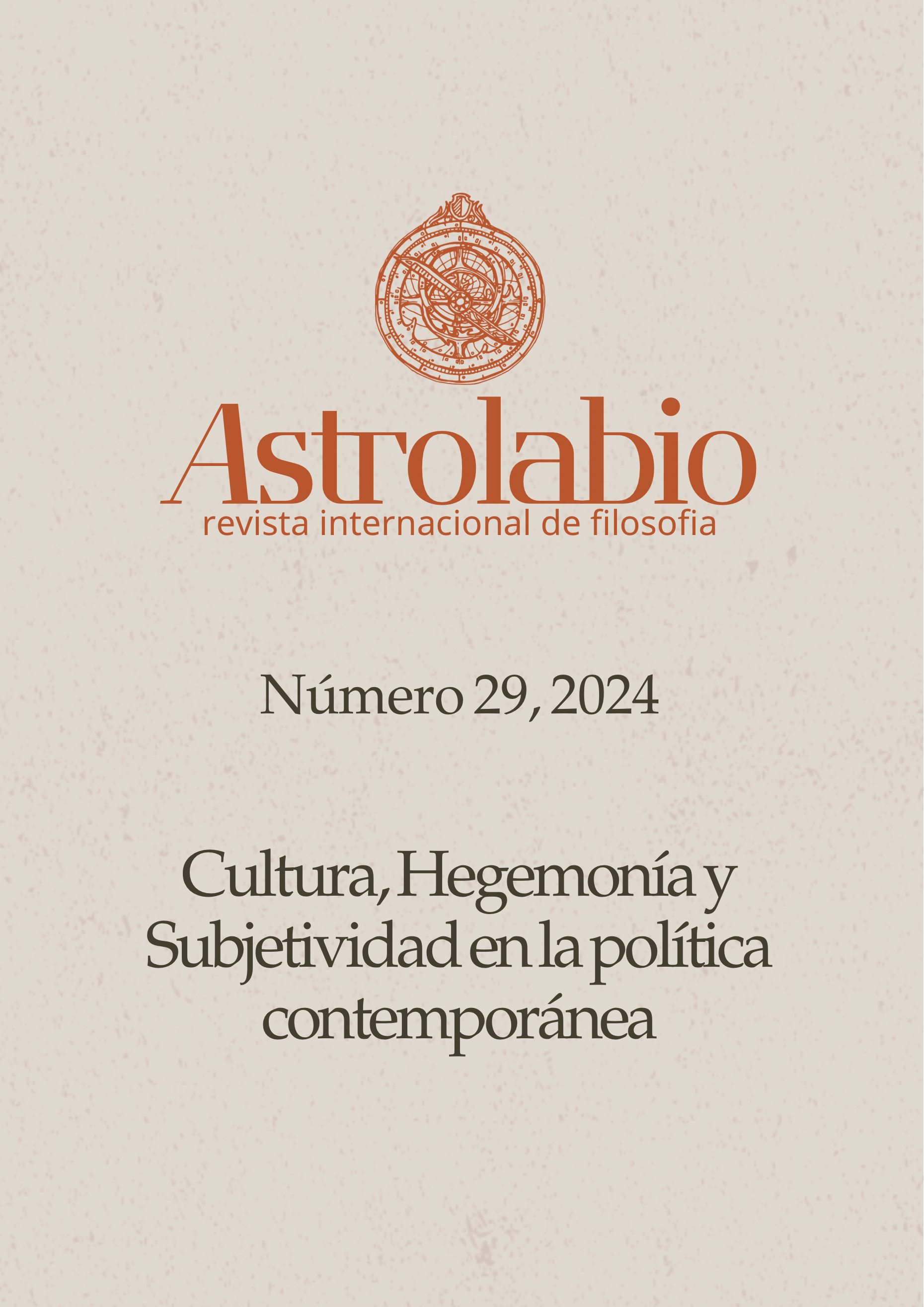Negri as a Reader of Spinoza
Productive Immanence and Constituent Power as Challenges to Contemporary Political Hegemony
DOI:
https://doi.org/10.1344/astrolabio.v1i29.47780Keywords:
Constituent power, Productive Immanence, Desutopia, Absolute Democracy, HegemonyAbstract
Antonio Negri, Italian philosopher and activist, is a central figure in contemporary political thought, known for his reinterpretation of Marx and Spinoza. In his work, Negri highlights how Spinoza breaks with the liberal political paradigm of the seventeenth century by proposing a radical democratic order. The concept of "productive immanence," which Negri takes from Spinoza, asserts that power should not be transferred to a sovereign figure but should arise directly from the multitude. Negri makes a crucial distinction between "constituent power" and "constituted power." While constituted power is formalized in state institutions and seeks to stabilize order, constituent power is a creative and expansive force that manifests through the cooperation of the multitude. This collective force cannot be contained by institutions and serves as the driving force of revolution, creating new forms of life and political organization. For Negri, desire is not a private passion but a collective energy that drives the multitude to resist constituted power and create new realities. This ability defines "absolute democracy," where power is exercised without institutional mediation. Negri proposes a "constitutive dystopia," where politics does not pursue a utopian end but is based on the continuous creation of new forms of life, overflowing the structures of modern power and generating a radical and immanent democracy.
References
Alliez, E. (1981). Spinoza más allá de Marx. Anthropos. Revista de Documentación Científica de La Cultura. Num: 144. Antonio Negri. Una Teoría Del Poder Constituyente. Visión Alternativa de La Filosofía Política, La Historia Como Proceso de Liberación, 61–63.
Althusser, L. (1974). Ideología y aparatos ideológicos de estado (Notas para una investigación). Editorial Oveja Negra.
Anderson, P. (2009). Las antinomias de Gramsci. Estado y Revolución en occidente. Ediciones Coyaocan.
Balibar, É. (2021). Spinoza político. Lo transindividual. Gedisa.
Braidotti, R. (2018). Por una política afirmativa. Itinerarios éticos. Gedisa.
Castoriadis, C. (2018). Hecho y por hacer. Pensar la imaginación. Enclave.
Deleuze, G. (1968). Spinoza et le problème de l’expression. Les Éditions de Minuit.
Deleuze, G. (1981). La anomalía salvaje: un gran libro. Anthropos. Revista de Documentación Científica de La Cultura. Num: 144. Antonio Negri. Una Teoría Del Poder Constituyente. Visión Alternativa de La Filosofía Política, La Historia Como Proceso de Liberación, 58–59.
Deleuze, G. (2001). Spinoza: Filosofía práctica. Tusquets Editores.
Deleuze, G. (2002). Diferencia y repetición. Amorrortu.
Deleuze, G. (2007a). Carta abierta a los jueces de Negri. In Dos regímenes de locos. Textos y entrevistas (1975-1995) (pp. 159–162). Pre-Textos.
Deleuze, G. (2007b). Este libro es, literalmente, una prueba de inocencia. In Dos regímenes de locos. Textos y entrevistas (1975-1995) (pp. 163–164). Pre-Textos.
Deleuze, G., & Guattari, F. (1994). El Antiedipo. Capitalismo y esquizofrenia I. Paidós.
Deleuze, G., & Guattari, F. (2001). ¿Qué es la filosofía? Anagrama.
Deleuze, G., & Guattari, F. (2002). Mil mesetas. Capitalismo y esquizofrenia II. Pre-Textos.
Didi-Huberman, G. (2023). Imaginar y recomenzar. Lo que nos levanta, 2. Abada Editores.
Dosse, F. (2009). Gilles Deleuze & Félix Guattari. Biographie croisée. La Découverte POCHE.
Field, S. (2012). Democracy and the Multitude: Spinoza against Negri. . Theoria: A Journal of Social and Political Theory 59 (131):21-40.
Foucault, M. (2008). Seguridad. Territorio. Población. Curso lectivo 1977-1978. Akal.
Fujita, J. (2021). ¿Cómo imponer un límite al capitalismo? Filosofía y política de Deleuze y Guattari. Tinta Limón.
Gómez, A. (2021). Ernesto Laclau y Chantal Mouffe: Populismo y hegemonía. Gedisa
Gramsci, A. (1999). Cuadernos de la cárcel. Tomo 5. Ediciones Era.
Hall, S. & G. L. (1986). On Postmodernism and Articulation: An Interwiew with Stuart Hall. Journal of Comunication Inquiry, Vol. 10, No 2.
Hardt, M. (2004). Deleuze. Un aprendizaje filosófico. Paidós.
Laclau, E. (2016). La razón populista. FCE.
Le Blanc, G. (2010). Mayo del 68 en Filosofía. Hacia la vía alternativa. In Deleuze político. Y nueve cartas inéditas de Gilles Deleuze (pp. 103–122). Nueva Visión.
López Petit, S. (1981). Spinoza en Moscú. Anthropos. Revista de Documentación Científica de La Cultura. Num: 144. Antonio Negri. Una Teoría Del Poder Constituyente. Visión Alternativa de La Filosofía Política, La Historia Como Proceso de Liberación, 50–53.
Negri, A. (1992). El poder constituyente. Ensayo sobre las alternativas de la modernidad. Traficantes de sueños.
Negri, A. (1993). La anomalía salvaje. Poder y potencia en Buruch Spinoza. Anthropos.
Negri, A. (2000). Spinoza subversivo. Akal.
Negri, A. (2001). Marx, más allá de Marx. Akal.
Negri, A. (2008). Descartes político. Akal.
Negri, A. (2011). Spinoza y nosotros. Ediciones Nueva Visión.
Negri, A. (2021). Spinoza ayer y hoy. Ensayos 3. Cactus.
Pardo, J. L. (2011). El cuerpo sin órganos. Presentación de Gilles Deleuze. Pre-Textos.
Rawls, J. (1999). A theory of justice. Harvard University Press.
Rousseau, J. J. (2001). Du contrat social. GF Flammarion.
Simondon, G. (2015). La individuación a la luz de las nociones de forma y de información. Cactus.
Spinoza. (1999). Ética demostrada según el orden geométrico. Alianza Editorial.
Spinoza. (2003). Tratado teológico político. Alianza Editorial.
Spinoza. (2004). Tratado político. Alianza Editorial.
Žižek, S. (2005). Objet a as Inherent Limit to Capitalism: On Michael Hardt and Antonio Negr. Https://Www.Lacan.Com/Zizmultitude.Htm.
Zourabichvili, F. (2011). Deleuze. Una filosofía del acontecimiento. Amorrortu.
Downloads
Published
How to Cite
Issue
Section
License
Copyright (c) 2024 Borja Muntadas

This work is licensed under a Creative Commons Attribution 4.0 International License.
Total or partial reproduction of the works published in the Journal is permitted, provided the source is cited.
The copyright of the articles published in the Journal belongs to the authors, with first publication rights reserved for this journal. The articles will be distributed under the CC BY 4.0 license (Attribution 4.0 International).



